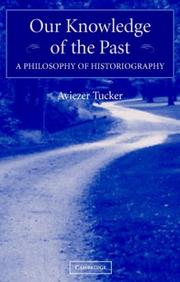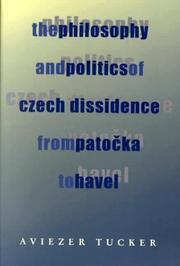| Listing 1 - 10 of 14 | << page >> |
Sort by
|

ISBN: 0521834155 9780521120777 9780521834155 9780511498381 0511196024 9780511196027 0511195362 9780511195365 0511193963 9780511193965 0511498381 1280477946 9781280477942 0521120772 1139931156 1107149487 051131437X 0511194706 0511193262 9781139931151 9781107149489 9780511194702 Year: 2004 Publisher: Cambridge Cambridge University Press
Abstract | Keywords | Export | Availability | Bookmark
 Loading...
Loading...Choose an application
- Reference Manager
- EndNote
- RefWorks (Direct export to RefWorks)
How do historians, comparative linguists, biblical and textual critics and evolutionary biologists establish beliefs about the past? How do they know the past? This book presents a philosophical analysis of the disciplines that offer scientific knowledge of the past. Using the analytic tools of contemporary epistemology and philosophy of science the book covers such topics as evidence, theory, methodology, explanation, determination and underdetermination, coincidence, contingency and counterfactuals in historiography. Aviezer Tucker's central claim is that historiography as a scientific discipline should be thought of as an effort to explain the evidence of past events. He also emphasizes the similarity between historiographic methodology to Darwinian evolutionary biology. This is an important, fresh approach to historiography and will be read by philosophers, historians and social scientists interested in the methodological foundations of their disciplines.
Criticism [Historical ] --- Critique historique --- Geschiedkundige methodologie --- Geschiedschrijving --- Geschiedschrijving--Methodologie --- Historical criticism --- Historical method --- Historical methodology --- Historiografie --- Historiographie --- Historiography --- Historische kritiek --- Historische methode --- Historische methodologie --- History--Criticism --- Kritiek [Historische ] --- Methodologie [Historische ] --- Methodology [Historical ] --- Historiography. --- History --- Philosophy. --- Philosophy --- History, Modern --- Authorship --- Criticism --- Arts and Humanities --- Histoire --- Philosophie

ISBN: 0822957280 0822941244 1306963389 0822972131 9780822972136 9781306963381 9780822957287 9780822941248 Year: 2000 Publisher: Pittsburgh : University of Pittsburgh Press,
Abstract | Keywords | Export | Availability | Bookmark
 Loading...
Loading...Choose an application
- Reference Manager
- EndNote
- RefWorks (Direct export to RefWorks)
Dissenters --- Philosophy, Czech --- Czechoslovakia --- Czech Republic --- Politics and government --- -Philosophy, Czech --- -Czech philosophy --- Dissidents --- Nonconformists --- Rebels (Social psychology) --- Conformity --- -Czechoslovakia --- -Politics and government --- -Dissenters --- -Chekhoslovakii︠a︡ --- Czechosłowacja --- Tsjechoslowakije --- Československá socialistická republika --- Czechoslovak Socialist Republic --- Chekhoslovat︠s︡kai︠a︡ Sot︠s︡ialisticheskai︠a︡ Respublika --- Čehoslovakija --- CSRS --- ČSSR --- Tschechoslowakei --- Tsjekkoslovakia --- Tsechoslobakia --- Tshīkūslūfākiyā --- Československo --- Československa republika --- Tchécoslovaquie --- Csehszlovákia --- Ceho-Slovacia --- ČSR --- Chieh-kʻo-ssu-lo-fa-kʻo --- Chieh-kʻo-ssu-lo-fa-kʻo she hui chu i kung ho kuo --- C.S.R.S. --- Č.S.S.R. --- Č.S.R. --- Cecoslovacchia --- Checoslovaquia --- Tschechische Sozialistische Republik --- Ts'ekhoslovaḳyah --- Czech and Slovak Federal Republic --- Česká a Slovenská Federativní Republika --- Česká a Slovenská Federatívna Republika --- Cseh-Szlovákia --- ČSFR --- ChSSR --- ChSFR --- Republika československa --- Češkoslovaška --- Czecho-Slovakia --- Česká republika --- ČR --- Tschechische Republik --- Česko --- Czechia --- チェコ --- Cheko --- チェコ共和国 --- Cheko Kyōwakoku --- Tschechien --- Tschechenland --- Tschechei --- République tchèque --- República Checa --- Chequia --- Txèquia --- Txeca --- República Txeca --- Češka --- Dissenters - Czechoslovakia. --- Philosophy, Czech - 20th century. --- Czechoslovakia - Politics and government - 1968-1989. --- Czech Republic - Politics and government - 1993 --- Graubünden --- Dissident --- Since 1900
Book
ISBN: 9781444337884 9781405149082 1405149086 1444337882 Year: 2010 Volume: 41 Publisher: Chichester, U.K.: Wiley-Blackwell,
Abstract | Keywords | Export | Availability | Bookmark
 Loading...
Loading...Choose an application
- Reference Manager
- EndNote
- RefWorks (Direct export to RefWorks)
"Like the encompassing nature of the other volumes in the Blackwell Companion to Philosophy series, undergraduate students and scholars with a serious interest in philosophical problems related to history and historiography should benefit from the newest Companion." (Reviews in Religion & Theology, 2012) "This volume does a fine job of showing the field's connections to many of the central concerns of contemporary philosophy. Part Four offers essays addressing the traditional schools and issues of philosophy of history and historiography, as well as valuable essays on postmodernism, Muslim philosophy of history, and philosophy of history at the end of the Cold War, among other topics.
930.21 --- 930.11 --- 930.11 Filosofie van de geschiedenis. Geschiedenisfilosofie --- Filosofie van de geschiedenis. Geschiedenisfilosofie --- 930.21 Historiografie. Geschiedenis van de geschiedwetenschap --- Historiografie. Geschiedenis van de geschiedwetenschap --- Historiography --- History --- History, Modern --- Philosophy --- History as a science --- Philosophy. --- Historiography - Philosophy. --- History - Philosophy. --- Historiography - Philosophy --- History - Philosophy --- Historiographie --- Histoire --- Philosophie
Book
ISBN: 9781509541201 1509541209 9781509541218 1509541217 Year: 2020 Publisher: Cambridge: Polity press,
Abstract | Keywords | Export | Availability | Bookmark
 Loading...
Loading...Choose an application
- Reference Manager
- EndNote
- RefWorks (Direct export to RefWorks)
It should not surprise anyone that democracies can become illiberal; it was one of the classical critiques of ancient democracies. Is the contemporary backlash against liberal democracy merely the same old story, or are we witnessing something unprecedented ? The author argues that the contemporary revival of absolutist populism combines the historically familiar with new technologies to produce a highly contagious new synthesis that threatens basic liberal norms. He examines how the economic crisis blocked social mobility and awakened the dark, dormant political passions exploited by demagogues. He argues that this slide toward 'neo-illiberal democracy' can only be countered if we hard-headedly institute policies that can dampen down populist passions and strengthen liberal institutional barriers against them.
DEMOCRACY --- LIBERALISM --- POPULISM --- Liberalism
Book
ISBN: 1316446662 131644709X 1316393054 1316447529 131644967X 1316447952 1107121264 1107549272 1316444082 9781316449240 1316449246 9781316449677 9781107121263 9781316393055 9781107549272 Year: 2015 Publisher: Cambridge Cambridge University Press
Abstract | Keywords | Export | Availability | Bookmark
 Loading...
Loading...Choose an application
- Reference Manager
- EndNote
- RefWorks (Direct export to RefWorks)
The first political theory of post-Communism examines its implications for understanding liberty, rights, transitional justice, property rights, privatization, rule of law, centrally planned public institutions, and the legacies of totalitarian thought in language and discourse. The transition to post-totalitarianism was the spontaneous adjustment of the rights of the late-totalitarian elite to its interest. Post-totalitarian governments faced severe scarcity in the supply of justice. Rough justice punished the perpetrators and compensated their victims. Historical theories of property rights became radical, and consequentialist theories, conservative. Totalitarianism in Europe disintegrated but did not end. The legacies of totalitarianism in higher education met New Public Management, totalitarian central planning under a new label. Totalitarianism divorced language from reality through the use of dialectics that identified opposites and the use of logical fallacies to argue for ideological conclusions. This book illustrates these legacies in the writings of Habermas, Derrida, and Žižek about democracy, personal responsibility, dissidence, and totalitarianism.
Post-communism. --- Totalitarianism. --- Totalitarian state --- Authoritarianism --- Collectivism --- Despotism --- Dictatorship --- Fascism --- National socialism --- Postcommunism --- World politics --- Communism
Article
Year: 1999
Abstract | Keywords | Export | Availability | Bookmark
 Loading...
Loading...Choose an application
- Reference Manager
- EndNote
- RefWorks (Direct export to RefWorks)
Book
ISBN: 9781009324489 1009324489 9781009565226 9781009324502 Year: 2025 Publisher: Cambridge Cambridge University Press
Abstract | Keywords | Export | Availability | Bookmark
 Loading...
Loading...Choose an application
- Reference Manager
- EndNote
- RefWorks (Direct export to RefWorks)
Book
ISBN: 9781138884847 9781315715865 9781317505266 9781317505273 9780815370598 1138884847 Year: 2016 Volume: 107 Publisher: New York: Routledge,
Abstract | Keywords | Export | Availability | Bookmark
 Loading...
Loading...Choose an application
- Reference Manager
- EndNote
- RefWorks (Direct export to RefWorks)
Social contract --- State, The --- Legitimacy of governments --- Globalization --- Philosophy --- Political aspects. --- Political philosophy. Social philosophy --- Theory of the state --- State, The - Philosophy --- Globalization - Political aspects.
Book

ISBN: 9789633865705 Year: 1998 Publisher: Budapest New York
Abstract | Keywords | Export | Availability | Bookmark
 Loading...
Loading...Choose an application
- Reference Manager
- EndNote
- RefWorks (Direct export to RefWorks)
Digital

ISBN: 9789633865705 Year: 1998 Publisher: Budapest ;; New York Central European University Press
Abstract | Keywords | Export | Availability | Bookmark
 Loading...
Loading...Choose an application
- Reference Manager
- EndNote
- RefWorks (Direct export to RefWorks)
| Listing 1 - 10 of 14 | << page >> |
Sort by
|

 Search
Search Feedback
Feedback About UniCat
About UniCat  Help
Help News
News